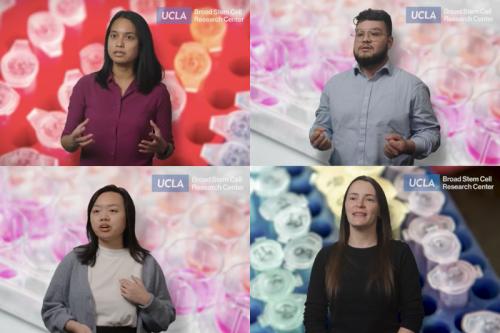
Science in 60 seconds: Watch our stem cell trainees pitch their research in one minute
Stem cell trainees at the Eli and Edythe Broad Center of Regenerative Medicine and Stem Cell Research at UCLA were challenged to communicate their often complex research in simple, everyday language through a one-minute video pitch during the 2023 Trainee Elevator Speech Contest.
The goal of this annual contest is to help the graduate students, post-docs and clinical fellows in the Center’s Stem Cell Training Program develop the skills necessary to talk about their research and why it matters with any audience – regardless of their level of scientific knowledge.
For Tasha Lin, M.D., a clinical fellow in the lab of Dinesh Rao, M.D., Ph.D., the importance of this science communications exercise became apparent when she was preparing her speech.
“We’re just so used to using the scientific jargon,” Lin said. “When I practiced with my family, they were like, ‘I have no idea what you’re talking about.’ “
Carlos Galván, a graduate student in the lab of William Lowry, Ph.D., added: “The majority of the population isn’t in the lab, so it’s important to transfer all that information we’re gathering to everybody, not just to scientists.”
Here are the winners of the 2023 Trainee Elevator Speech Contest:
1st place: Patricia Loren Nano, Ph.D., a post-doc in the lab of Aparna Bhaduri, Ph.D.
Pinpointing the causes of neurodevelopmental disorders
Patricia Loren Nano, Ph.D., explains how she uses a computational pipeline and a stem cell-derived experimental model to gain a better understanding of human brain development. She hopes this work will lead to a more precise understanding of human brain development and how this process differs in people with neurodevelopmental disorders such as autism spectrum disorder and schizophrenia, which could inform the development of therapeutics to improve the quality of life for those living with these conditions.
2nd place: Carlos Galván, a graduate student in the lab of William Lowry, Ph.D.
Starving cancer cells to prevent the growth of skin cancer squamous cell carcinoma
Carlos Galván describes his work to identify the nutrients that enable the growth of squamous cell carcinoma, the second most common type of skin cancer. His ultimate goal is to take away the nutrients to starve the cancer and prevent its growth.
3rd place: Mary Doan, a graduate student in the lab of Michael Teitell, M.D., Ph.D.
Improving the production of cell types for regenerative or cell replacement therapies
Mary Doan studies how pluripotent stem cells, cells that can differentiate into any cell type in the body, “eat” or use specific nutrients to enable their next identity. She hopes this research will improve the production of specific cell types for use in regenerative or cell replacement therapies that can heal or replace a patient’s damaged tissues or organs.
4th place: Amanda Collier, Ph.D., a post-doc in the lab of Kathrin Plath, Ph.D.
Developing stem cell-based embryo models to identify the causes of infertility
Amanda Collier, Ph.D., generates patient-specific stem cell-based embryo models in a dish to examine what is required for successful embryo implantation and development during an in vitro fertilization, or IVF, cycle. She hopes that by studying the elusive stages of early human embryo development, she can gain a deeper understanding of infertility, early pregnancy loss and developmental disorders and contribute to the development of appropriate therapeutics.
Watch all of the 2023 trainee elevator speeches on this YouTube playlist: